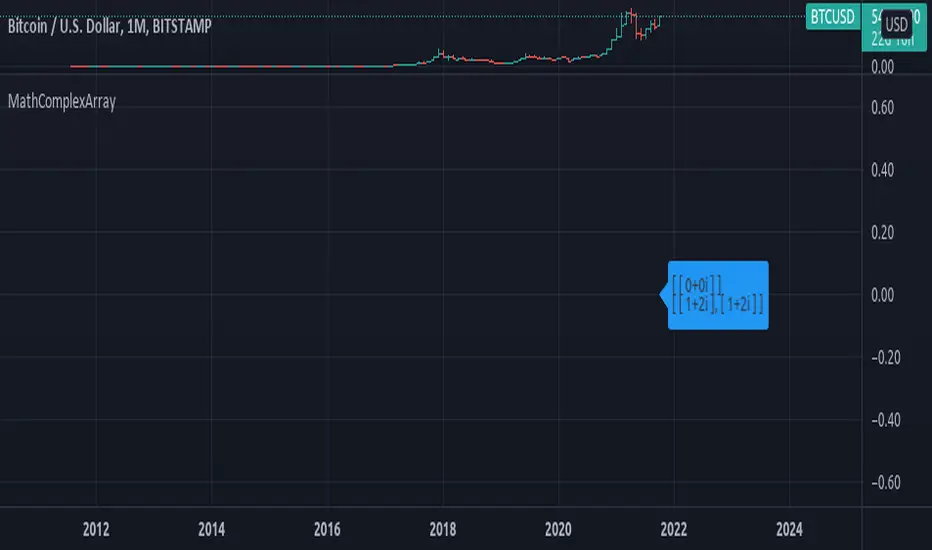PINE LIBRARY
Updated MathComplexArray

Library "MathComplexArray"
Array methods to handle complex number arrays.
new(size, initial_complex) Prototype to initialize a array of complex numbers.
Parameters:
Returns: float array, pseudo complex Array in the form of a array [0:real, 1:imaginary, 2:real, 3:imaginary,...]
get(id, index) Get the complex number in a array, in the form of a array [real, imaginary]
Parameters:
Returns: float array, pseudo complex number in the form of a array [real, imaginary]
set(id, index, complex_number) Sets the values complex number in a array.
Parameters:
Returns: Void, updates array id.
push(id, complex_number) Push the values into a complex number array.
Parameters:
Returns: Void, updates array id.
pop(id, complex_number) Pop the values from a complex number array.
Parameters:
Returns: Void, updates array id.
to_string(id, format) Reads a array of complex numbers into a string, of the form: "[ [a+bi], ... ]""
Parameters:
Returns: string, translated complex array into string.
Array methods to handle complex number arrays.
new(size, initial_complex) Prototype to initialize a array of complex numbers.
Parameters:
- size: size of the array.
- initial_complex: Complex number to be used as default value, in the form of array [real, imaginary].
Returns: float array, pseudo complex Array in the form of a array [0:real, 1:imaginary, 2:real, 3:imaginary,...]
get(id, index) Get the complex number in a array, in the form of a array [real, imaginary]
Parameters:
- id: float array, ID of the array.
- index: int, Index of the complex number.
Returns: float array, pseudo complex number in the form of a array [real, imaginary]
set(id, index, complex_number) Sets the values complex number in a array.
Parameters:
- id: float array, ID of the array.
- index: int, Index of the complex number.
- complex_number: float array, Complex number, in the form: [real, imaginary].
Returns: Void, updates array id.
push(id, complex_number) Push the values into a complex number array.
Parameters:
- id: float array, ID of the array.
- complex_number: float array, Complex number, in the form: [real, imaginary].
Returns: Void, updates array id.
pop(id, complex_number) Pop the values from a complex number array.
Parameters:
- id: float array, ID of the array.
- complex_number: float array, Complex number, in the form: [real, imaginary].
Returns: Void, updates array id.
to_string(id, format) Reads a array of complex numbers into a string, of the form: "[ [a+bi], ... ]""
Parameters:
- id: float array, ID of the array.
- format: string, format of the number conversion, default='#.##########'.
Returns: string, translated complex array into string.
Release Notes
v2 update for type, except for to_string() the library is mostly deprecated now since its possible to use array methods directly with types.Pine library
In true TradingView spirit, the author has published this Pine code as an open-source library so that other Pine programmers from our community can reuse it. Cheers to the author! You may use this library privately or in other open-source publications, but reuse of this code in publications is governed by House Rules.
Disclaimer
The information and publications are not meant to be, and do not constitute, financial, investment, trading, or other types of advice or recommendations supplied or endorsed by TradingView. Read more in the Terms of Use.
Pine library
In true TradingView spirit, the author has published this Pine code as an open-source library so that other Pine programmers from our community can reuse it. Cheers to the author! You may use this library privately or in other open-source publications, but reuse of this code in publications is governed by House Rules.
Disclaimer
The information and publications are not meant to be, and do not constitute, financial, investment, trading, or other types of advice or recommendations supplied or endorsed by TradingView. Read more in the Terms of Use.